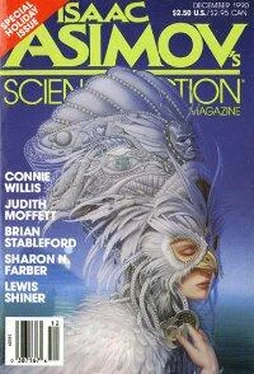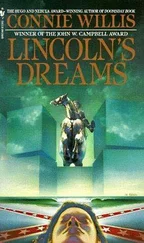Connie Willis - Cibola
Здесь есть возможность читать онлайн «Connie Willis - Cibola» весь текст электронной книги совершенно бесплатно (целиком полную версию без сокращений). В некоторых случаях можно слушать аудио, скачать через торрент в формате fb2 и присутствует краткое содержание. Год выпуска: 1990, Издательство: Davis Publications, Inc., Жанр: Фантастика и фэнтези, на английском языке. Описание произведения, (предисловие) а так же отзывы посетителей доступны на портале библиотеки ЛибКат.
- Название:Cibola
- Автор:
- Издательство:Davis Publications, Inc.
- Жанр:
- Год:1990
- ISBN:нет данных
- Рейтинг книги:5 / 5. Голосов: 1
-
Избранное:Добавить в избранное
- Отзывы:
-
Ваша оценка:
- 100
- 1
- 2
- 3
- 4
- 5
Cibola: краткое содержание, описание и аннотация
Предлагаем к чтению аннотацию, описание, краткое содержание или предисловие (зависит от того, что написал сам автор книги «Cibola»). Если вы не нашли необходимую информацию о книге — напишите в комментариях, мы постараемся отыскать её.
Cibola — читать онлайн бесплатно полную книгу (весь текст) целиком
Ниже представлен текст книги, разбитый по страницам. Система сохранения места последней прочитанной страницы, позволяет с удобством читать онлайн бесплатно книгу «Cibola», без необходимости каждый раз заново искать на чём Вы остановились. Поставьте закладку, и сможете в любой момент перейти на страницу, на которой закончили чтение.
Интервал:
Закладка:
Cibola
by Connie Willis
“Carla, you grew up in Denver,” Jake said. “Here’s an assignment that might interest you.”
This is his standard opening line. It means he is about to dump another “local interest” piece on me.
“Come on, Jake,” I said. “No more nutty Bronco fans who’ve spray-painted their kids orange and blue, okay? Give me a real story. Please?”
“Bronco season’s over, and the NFL draft was last week,” he said. “This isn’t a local interest.”
“You’re right there,” I said. “These stories you keep giving me are of no interest, local or otherwise. I did the time machine piece for you. And the psychic dentist. Give me a break. Let me cover something that doesn’t involve nuttos.”
“It’s for the ‘Our Living Western Heritage’ series.” He handed me a slip of paper. “You can interview her this morning and then cover the skyscraper moratorium hearings this afternoon.”
This was plainly a bribe, since the hearings were front page stuff right now, and “historical interests” could be almost as bad as locals—senile old women in nursing homes rambling on about the good old days. But at least they didn’t crawl in their washing machines and tell you to push “rinse” so they could travel into the future. And they didn’t try to perform psychic oral surgery on you.
“All right,” I said, and took the slip of paper. “Rosa Turcorillo,” it read and gave an address out on Santa Fe. “What’s her phone number?”
“She doesn’t have a phone,” Jake said. “You’ll have to go out there.” He started across the city room to his office. “The hearings are at one o’clock.”
“What is she, one of Denver’s first Chicano settlers?” I called after him.
He waited till he was just outside his office to answer me. “She says she’s the great-granddaughter of Coronado,” he said, and beat a hasty retreat into his office. “She says she knows where the Seven Cities of Cibola are.”
I spent forty-five minutes researching Coronado and copying articles and then drove out to see his great-granddaughter. She lived out on south Santa Fe past Hampden, so I took I-25 and then was sorry. The morning rush hour was still crawling along at about ten miles an hour pumping carbon monoxide into the air. I read the whole article stopped behind a semi between Speer and Sixth Avenue.
Coronado trekked through the Southwest looking for the legendary Seven Cities of Gold in the 1540s, which poked a big hole in Rosa’s story, since any great-granddaughter of his would have to be at least three hundred years old.
There wasn’t any mystery about the Seven Cities of Cibola either. Coronado found them, near Gallup, New Mexico, and conquered them but they were nothing but mud-hut villages. Having been burned once, he promptly took off after another promise of gold in Quivira in Kansas someplace where there wasn’t any gold either. He hadn’t been in Colorado at all.
I pulled onto Santa Fe, cursing Jake for sending me on another wild-goose chase, and headed south. Denver is famous for traffic, air pollution, and neighborhoods that have seen better days. Santa Fe isn’t one of those neighborhoods. It’s been a decaying line of rusting railroad tracks, crummy bars, old motels, and waterbed stores for as long as I can remember, and I, as Jake continually reminds me, grew up in Denver.
Coronado’s granddaughter lived clear south past Hampden, in a trailer park with a sign with “Olde West Motel” and a neon bison on it, and Rosa Turcorillo’s old Airstream looked like it had been there since the days when the buffalo roamed. It was tiny, the kind of trailer I would call “Turcorillo’s modest mobile home” in the article, no more than fifteen feet long and eight wide.
Rosa was nearly that wide herself. When she answered my knock, she barely fit in the door. She was wearing a voluminous turquoise housecoat, and had long black braids.
“What do you want?” she said, holding the metal door so she could slam it in case I was the police or a repo man.
“I’m Carla Johnson from the Denver Record ,” I said. “I’d like to interview you about Coronado.” I fished in my bag for my press card. “We’re doing a series on ‘Our Living Western Heritage.’” I finally found the press card and handed it to her. “We’re interviewing people who are part of our past.”
She stared at the press card disinterestedly. This was not the way it was supposed to work. Nuttos usually drag you in the house and start babbling before you finish telling them who you are. She should already be halfway through her account of how she’d traced her ancestry to Coronado by means of the I Ching.
“I would have telephoned first, but you didn’t have a phone,” I said.
She handed the card to me and started to shut the door.
“If this isn’t a good time, I can come back,” I babbled. “And we don’t have to do the interview here if you’d rather not. We can go to the Record office or to a restaurant.”
She opened the door and flashed a smile that had half of Cibola’s missing gold in it. “I ain’t dressed,” she said. “It’ll take me a couple of minutes. Come on in.”
I climbed the metal steps and went inside. Rosa pointed at a flowered couch, told me to sit down and disappeared into the rear of the trailer.
I was glad I had suggested going out. The place was no messier than my desk, but it was only about six feet long and had the couch, a dinette set, and a recliner. There was no way it would hold me and Coronado’s granddaughter, too. The place may have had a surplus of furniture but it didn’t have any of the usual crazy stuff, no pyramids, no astrological charts, no crystals. A deck of cards was laid out like the tarot on the dinette table, but when I leaned across to look at them, I saw it was a half-finished game of solitaire. I put the red eight on the black nine.
Rosa came out, wearing orange polyester pants and a yellow print blouse and carrying a large black leather purse. I stood up and started to say, “Where would you like to go? Is there someplace close?” but I only got it half out.
“The Eldorado Cafe,” she said and started out the door, moving pretty fast for somebody three hundred years old and three hundred pounds.
“I don’t know where the Eldorado Cafe is,” I said, unlocking the car door for her. “You’ll have to tell me where it is.”
“Turn right,” she said. “They have good cinnamon rolls.”
I wondered if it was the offer of the food or just the chance to go someplace that had made her consent to the interview. Whichever, I might as well get it over with. “So Coronado was your great-grandfather?” I said.
She looked at me as if I were out of my mind. “No. Who told you that?”
Jake, I thought, who I plan to tear limb from limb when I get back to the Record . “You aren’t Coronado’s great-granddaughter?”
She folded her arms over her stomach. “I am the descendant of El Turco.”
El Turco. It sounded like something out of Zorro . “So it’s this El Turco who’s your great-grandfather?”
“Great- great . El Turco was Pawnee. Coronado captured him at Cicuye and put a collar around his neck so he could not run away. Turn right.”
We were already halfway through the intersection. I jerked the steering wheel to the right and nearly skidded into a pickup.
Rosa seemed unperturbed. “Coronado wanted El Turco to guide him to Cibola,” she said.
I wanted to ask if he had, but I didn’t want to prevent Rosa from giving me directions. I drove slowly through the next intersection, alert to sudden instructions, but there weren’t any. I drove on down the block.
Читать дальшеИнтервал:
Закладка:
Похожие книги на «Cibola»
Представляем Вашему вниманию похожие книги на «Cibola» списком для выбора. Мы отобрали схожую по названию и смыслу литературу в надежде предоставить читателям больше вариантов отыскать новые, интересные, ещё непрочитанные произведения.
Обсуждение, отзывы о книге «Cibola» и просто собственные мнения читателей. Оставьте ваши комментарии, напишите, что Вы думаете о произведении, его смысле или главных героях. Укажите что конкретно понравилось, а что нет, и почему Вы так считаете.












